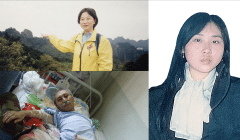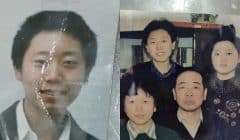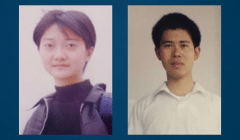Misled?

It was at that moment that she realized she could no longer deny what many of her American friends had told her.
The Chinese government had been lying to her, and Yang now knew it. Lying to her, that is, her entire life. But most alarming of all, Yang recalls, was that she had unwittingly become part of the lie.
Despite a privileged, university-level education in China and much exposure to the outside world, Yang was still misled by her government as to basic realities of history and the world today. And, emboldened by a sense of nationalism, she was led to promote her government’s political propaganda abroad, in America.
What makes Yang’s story so important is that it could be the story of many Chinese-Americans. And indeed, that story has played out many times across New York City.
A Massacre Masqueraded
Anne Yang came to the United States on a scholarship in 1997 following study at Fudan University in her native China. Extremely bright, creative, and good-humored, Yang represented a new generation of urban, cosmopolitan Chinese. She was China’s Internet generation, after all.
“Or supposedly, at least” Yang says, looking back with a leery grin.
Yang was eager to share her culture with American classmates. But time and again discussions would take a turn for the awkward when one particular topic was broached.
“Tiananmen Square—1989,” Yang recalls.
The 1989 Tiananmen Massacre was still vivid in the minds of Yang’s American classmates. Many were just coming of age when chilling images flooded the news in ’89 depicting innocent Beijing student demonstrators being gunned down and crushed—literally—by Chinese army tanks. As many as 3,000 were murdered that fateful day in June.
But Yang remembered—or imagined—the event quite differently. Her education in China, just as with media portrayals there, had told her something to the contrary.
She had been taught that it was, incredibly, students who did the killing on Tiananmen. “Rioting students” had overtaken the Square and attacked “innocent” Chinese soldiers. Her textbooks told of soldiers being cruelly burned by students, while state-run television even supplied footage of burning tanks and soldiers who were killed or severely burned by the “rioting” students. News reported that the Chinese regime “wisely” and effectively “restored order.”
And so each time the topic of Tiananmen arose in conversation, Anne would dutifully explain to friends that they were “misled.” Americans, she insisted, had been deceived by “hostile anti-China forces” and U.S. “imperialist propaganda.”
No massacre ever took place, Yang insisted to any who would listen.
“The government handled the whole matter in a ‘humane’ and ‘benevolent’ way, we were taught,” Yang explains today. “We never knew anything about the truth. In college, even, I never learned otherwise.”
“Looking back, it’s incredible that the whole world could know the truth and we, in China, who were closest to those events knew nothing of reality. Even years later.”
Yang would eventually discover the truth about Tiananmen, but not until yet another, similar, tragedy befell China. This time, it was closer to home. Close enough that Yang knew better.
And so it was that tears streamed down Yang’s cheeks that day in July, six years ago, as she sat in the computer lab. She was reading headlines coming out of China which said, this time, that the Falun Gong meditation group was now banned for being a “menace” that “threatened social stability.”
Anne knew deeply it wasn’t true. But the revelation was painful: how much else that her government taught her wasn’t true?
And what, even, had she unknowingly become a part of?
A Campaign of Disinformation
Two years earlier, Anne and her husband had taken up Falun Gong, a traditional Chinese discipline of exercise, meditation, and principled living. In 1998 the Chinese government estimated that as many as 100 million were doing the yoga-like practice in China. That amounted to roughly 8% of the country’s population.
On July 20, 1999, the popular practice met with calamity. Resenting Falun Gong’s broad appeal, China’s Communist leader at the time, Jiang Zemin, ordered the practice banned and launched a nation-wide campaign to “eradicate” it. Systematic brainwashing, arrest, and torture of adherents came to define the violent suppression. Some 100 million people overnight became “criminals” in China simply by virtue of their popular, peaceful beliefs.
But violence was only one weapon in the government’s assault. Spearheading the campaign was China’s state-run media, which churned out a nearly-endless stream of programs and articles vilifying Falun Gong. They labeled it “evil” and “anti-China,” calling its practitioners “rats” of society, “criminals,” or worse.
Soon, in a move reminiscent of the Cultural Revolution, authorities in China began utilizing nearly every institution possible with the aim of mobilizing China’s populace against Falun Gong.
School textbooks and exams—from primary schools to universities—began to include anti-Falun Gong content, which students must “learn” in order to advance. “Transformation” (brainwashing) sessions were set up in every workplace throughout the country, and all Falun Gong adherents made to attend. Nothing less than total thought control was the government’s goal.
Mechanisms were quickly put in place to carry out the mandate. A Gestapo-like agency, the “610 Office,” was created with the task of overseeing Falun Gong’s “eradication” and given power over the courts and police, among other entities. Personnel were stationed in nearly every government office and police station. All the while, state media continued to churn out falsified reports, painting Falun Gong as a threat to society—a threat the “great and glorious” Communist Party would defeat, restoring “social order” in China. Echoes of Tiananmen reverberated.
The parallels didn’t escape Anne Yang that painful day as she read the headlines. It was the same thing, only in a different guise, she realized. Instead of student activists, now it was peaceful meditators.
“But how many others would see through it?” Yang pondered. And especially, how many Chinese-Americans like herself?
Unwitting Distributors in NYC
China’s tawdry campaign, with the passage of time, began to slowly remold public opinion on Falun Gong to a certain degree.
That proved especially true among Chinese communities abroad. To some extent it had to do with lack of exposure. When China’s regime launched the suppression many Chinese in America and the West weren’t all that familiar with Falun Gong. The practice hadn’t caught on yet like it had in China, where every morning parks were filled with people practicing Falun Gong. Many thus never got to know Falun Gong firsthand or on their own.
Chinese authorities seized on that fact and quickly stepped in. It had just the vehicle it needed: international Chinese media.
According to the Jamestown Foundation—a Washington DC foreign policy think-tank—three of the four major Chinese-language newspapers in the U.S. are “either directly or indirectly controlled by the government of Mainland China.” The fourth, meanwhile, has “recently begun bowing to pressure from the Beijing government.”
Using these channels, the propaganda campaign regularly landed on the front pages of Chinese-language newspapers across America. In New York City alone, for example, one such Chinese newspaper ran over 300 falsified articles in three years’ time. These “news” stories portrayed Falun Gong practitioners as “criminals,” “murderers,” “scum,” and so on.
That rhetoric began to sink—or seep—in over time. With their native country engulfed in anti-Falun Gong propaganda, and Chinese print media and TV here marching in step, many Chinese in the U.S. came to adopt strong, negative opinions about Falun Gong. For some it went as far as hatred. Most surprising, perhaps, was that well-educated Chinese-Americans, much like Yang before them, fared little better than their kin in sorting out the news from the nonsense. And so it was that China’s Communist Party wormed its hatred into homes and workplaces right here, in New York City.
Just ask Scott Chinn.
The tall, broad-shouldered Caucasian American is hardly the picture of China’s “public enemy #1.” Yet such was Chinn made to feel last fall. That was when a Chinese colleague at the New York media company where he worked learned of his practicing Falun Gong.
While Chinn was having lunch one day with colleagues, the conversation turned to Falun Gong. At the other end of the table, Jane Zhu (pseudonym), a contractor working on Chinn’s team, exploded. Zhu yelled, “What?? You practice that?? I can’t believe it!” Her face flush with anger, she stood up and stormed out of the café, leaving behind a table stunned into awkward silence.
“Everyone was pretty shocked by her reaction,” Chinn recalls, “but I’d actually seen this kind of thing before. I’ve done a lot of volunteer work to stop the human rights abuses against Falun Gong in China, and I would come across people who think of themselves as patriotic Chinese, and, because of that, detest Falun Gong.”
“What’s key to understand,” Chinn explains, “is that the Chinese government has not only made up a lot of stories to demonize Falun Gong, but also done a lot to blur the concept of ‘China’ with the idea of ‘the Chinese Communist Party,’ and that way whenever the Party attacks somebody or some group as an ‘enemy,’ people think that group is China’s enemy, and by extension, their own enemy.”
Having someone in the office angry at him because of his spiritual practice was troublesome, but Scott says his main concern was for Jane herself.
“Imagine hating someone because of their spirituality, and doing so simply because Government propaganda convinced you to,” Scott explains.
“What’s really sad is that, as far as I know, Jane had never even met a person who practices Falun Gong… she had never read the Falun Gong books, and she certainly never talked to me about it… all that hate and anger… where does it come from? It was entirely based on what the Chinese Government had propagated.”
A second incident was revealing. While Chinn was at a bar with project teammates celebrating a recent product launch, the topic of Falun Gong came up again. This time when Zhu overheard the conversation, she hollered at the group, “Falun Gong is evil!” and marched out of the bar.
The looks on her coworkers’ faces must have had an effect. For the next day an embarrassed Zhu approached Chinn and apologized. She confided, “I don’t know what came over me… I know that’s all just Communist propaganda.”
Yet so deeply embedded in Zhu’s mind was the Party’s line on Falun Gong that she couldn’t hold back. It still came out, almost with a life of its own. Even though on some level she knew better the hatred was still there, embedded in her thoughts.
“You can just imagine, then, how some Chinese-Americans react when they don’t know better, when they don’t know it was propaganda they took in,” Chinn says.
Outburst on the Trading Floor
Kent Konkol, a 34-year-old portfolio manager for a mid-town investment bank, can identify with Chinn’s experience.
In the spring of 2001, Konkol received an acerbic e-mail from his Chinese co-worker, Charles Liu (pseudonym). The e-mail’s contents attacked Falun Gong, reiterating many a label used in Chinese government propaganda. Konkol later learned that the e-mail had been sent to their entire team. It was Charles’s response to another co-worker’s inquiry about the suppression of Falun Gong in China.
Despite the email’s negative slant on the practice, Konkol took an interest in Falun Gong and looked into the discipline further, learning the exercises and reading about it.
It was not until the spring of 2004, however, that a conversation between Konkol and Liu turned to the topic of Falun Gong. Konkol informed his co-worker that he had taken up Falun Gong and found it very beneficial.
Konkol says Liu, though polite, expressed strong opinions against the practice. “He was very much against what he believed were tenets of the practice,” Konkol recalls. “But it was pretty clear to me that he didn’t know much about it. He had, either consciously or unconsciously, taken in and believed what the Chinese Government propagated about Falun Gong.”
Soon after, Liu’s strange dislike of the practice would come to a head, this time for their whole trading floor to see. The trigger was as unlikely as it is indicative.
Konkol had been setting out a free, startup newspaper inside his company that reported often on China issues, including the suppression of Falun Gong. The paper had won Konkol’s admiration with its frank reporting.
Liu, however, saw the gesture in a different light. He proceeded to confront Konkol at his desk.
“He thought, since the paper reported fairly on Falun Gong, that this was some kind of plot or something. He went on to express a barrage of negative opinions about Falun Gong that were pretty off base,” Konkol recollects.
Liu’s anger was visible. So much so, in fact, that their boss later called Liu, and then Konkol, in to his office to see what had so upset Liu.
“The issue was resolved amicably,” says Konkol, “but I think the episode demonstrated just how far and wide propaganda from China’s Communist regime has reached… and to what extent it can affect Chinese people’s thoughts about Falun Gong—even here in New York City.”
A Hope for Dispelling Hate
The current Chinese leadership has done quite a job spreading its message of hate here in New York. It has organized rallies in Chinatown, run seminars, erected propaganda displays in its consulate, bought up and pressured Chinese-language media, and even done mailings to local government officials. All meant to denigrate Falun Gong.
Yet Anne Yang remains hopeful through it all.
Yang says she sees herself—the self of five years ago—in the many Chinese around her who are misled about Falun Gong.
“They are like me to a T,” says Yang. And though it’s not about Tiananmen this time, Yang adds that, “It’s as if we’re following the exact same script, and I guess, in a sense, we are: it’s the CCP’s [Chinese Communist Party’s] script.”
She remains hopeful, though, in that her fellow Chinese here in the U.S. have ready access to a wealth of information. “Information,” Yang declares, “that is blocked in China.”
“My advice to everybody is simple: look into the issues for yourselves,” she says.
“Here, you can.”






